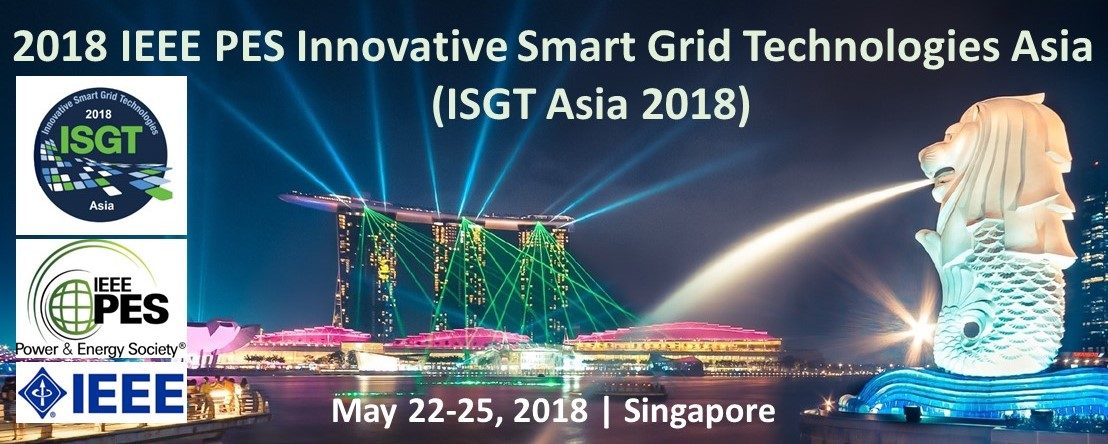| Special Session 4 | Artificial Intelligence Approaches for Smart Grid and Sustainable Energy Systems |
| Organizers | Zhi-Le Yang, Shenzhen Institute of Advanced Technology, China Haiping Ma, Shenzhen Institute of Advanced Technology, China Yuanjun Guo, Shenzhen Institute of Advanced Technology, China Yimin Zhou, Shenzhen Institute of Advanced Technology, China |
| Date and Time | 24 May 2018, 01.30 pm – 03.00 pm |
| Location | MR309 |
| Details |
Due to the emerging technical breakthroughs on implementation platforms and well-known applications, artificial intelligence (AI) has become one of the most popular topics among numerous science and engineering research communities. Typical AI techniques such as neural networks, expert systems, fuzzy logic, and evolutionary computations have brought an advancing frontier towards various of engineering applications, providing powerful tools for modelling, control, complex optimization, state estimation, and fault diagnostics in power grid and sustainable energy systems. Moreover, more interesting and practical applications on smart grid and energy systems are promising to be proposed by adopting the novel deep learning and other AI approaches and platforms. This special session intends to bring together the state-of-the-art advances of AI approaches for solving emerging problems in smart grid and sustainable energy systems. The submissions are encouraged to be focus on but not limited to neural networks, expert systems, fuzzy logic, robust computing, and evolutionary computations with the applications to smart grid scheduling, renewable generations forecasting and integrations, battery modelling and charging strategy, plug-in electric vehicles power-trains scheduling, fault diagnosis for generators and all relevant topics. A brief list of potential submission topic is shown below:
|
| Bio |
Dr. Zhi-Le Yang obtained BSc and MSc degrees both at Shanghai University, China, and received Ph.D. degree at Queen’s University Belfast, UK. He is currently an assistant professor at Shenzhen Institute of Advanced Technology, Chinese Academy of Sciences, China. His research interests focus on computational intelligence especially evolutionary computation methods and their applications on smart grid, renewable energy, electric vehicles and various energy systems. He is the author or co-author of more than 40 articles in peer reviewed international journals and conferences. He was the founding chair of IEEE QUB student branch and an active member of IEEE PES, CIS and SMC societies. He has been the secretary general for several international conferences and an active reviewer for over 20 peer reviewed international journals. Dr. Hai-ping Ma received the B. S. degree from Shaoxing University, Shaoxing, China, the M. S. degree from the Taiyuan University of Technology, Taiyuan, China, and the Ph. D. degree from Shanghai University, Shanghai, China, in 2004, 2007, and 2014, respectively, all in control theory and control engineering. He is currently an Associate Professor with the College of Mathematics, Physics and Information, Shaoxing University. From 2015 to 2016, he was a Postdoctoral research fellow with the Group of Networked Sensing and Control, Zhejiang University, Hangzhou, China. From 2016 to 2017, he was a visiting scholar with the school of Electronics, Electrical Engineering and Computer Science, Queen’s University, Belfast, UK. In 2015, he received the Outstanding Ph. D. Dissertation Award, Chinese Association of System Simulation, China. He has published over 30 research papers on evolutionary algorithms and applications. His current research interests include evolutionary computation, information fusion, and intelligent control. He is the author of the textbook Evolutionary Computation with Biogeography-based Optimization (Wiley-ISTE, 2017). Dr. Yuan-jun Guo obtained BSc and MSc degrees both at Chongqing University, China, and received Ph.D. degree at Queen’s University Belfast, UK, in 2004, 2008 and 2015, respectively. She is currently an assistant professor at Shenzhen Institute of Advanced Technology, Chinese Academy of Sciences, China. Her research interests focus on Big Data analytics, artificial intelligent algorithms and their applications in Smart Grid fault detection and monitoring. She is the author or co-author of more than 20 articles in peer reviewed international journals and conferences. Dr. Yi-min Zhou received the Ph.D. degree in control engineering from the University of Oxford, Oxford, U.K., in 2008. Currently, she is an Associate Professor with the Shenzhen Institutes of Advanced Technology, Chinese Academy Sciences, Shenzhen, China. Her research interests include nonlinear control, fault diagnosis, neuro-fuzzy modeling, machine learning, and other artificial intelligence with the applications to energy management and vehicles systems. She is the author or co-author of more than 80 articles in peer reviewed international journals and conferences. |
| Speaker summary: | will be announced soon |
Copyright © 2024 | WordPress Theme by MH Themes

Leave a Reply